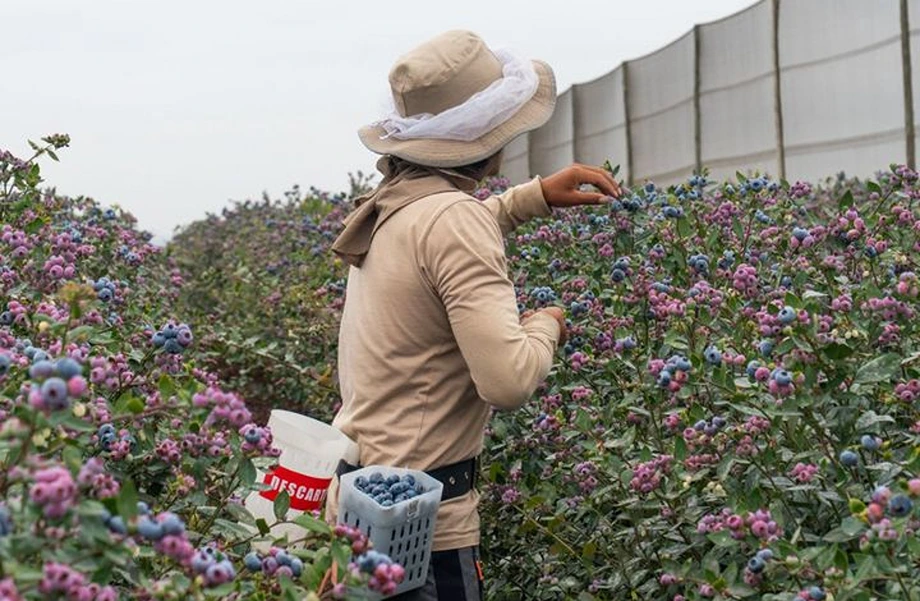In Italy, organic blueberry is still part of a "niche" context with many difficulties and critical issues compared to conventional farming. however, producers and operators are increasingly interfacing toward more innovative and environmentally sustainable techniques.
Speaking on this subject for Italian Berry was Andrea Ferrato of Ag. Bioferrato, based in Revello (CN).
How does blueberry fit within the biological context?
"As far as we are concerned, we grow 4 hectares of blueberries and have found that it is a crop that lends itself well to this type of tillage. With all the concerns there have been about water supplies this year, we can say that they have not been totally directed at blueberry. We were also able to harvest a few years ago, in 2020, when we had a historic frost here-we're talking about harvesting around 80 percent of the crop."

What are some of the critical issues you face when it comes to organic?
"If we talk about critical issues in general, it goes without saying that in organic we have to deal with issues that in conventional do not even cause concern, this is for obvious reasons. We are talking about a different set of methods and techniques, often even less effective when compared to the help that certain products give in the conventional sector. On the other hand, punctuality of operations and a certain kind of study and monitoring of the physiological stages of the crop becomes very important."

Speaking of the market instead, how do you foresee the performance of the organic segment?
"At the commercial level, the organic sector is facing some challenges, especially in terms of production periods. There are many pushes from abroad, the market window is getting thinner and thinner. On the GDO side, on the other hand, we can rely more and more on scaled-down spaces, so even in terms of visibility we cannot speak of improvement."

In what ways do we need to work to make an improvement concrete?
"We organic producers should definitely not despair. It is good for us to reason behind all this smokescreen that has been created. We must be convinced of what we have done and move forward by increasing and consolidating our knowledge. In my opinion, it will also be of great importance to create and spread a strong and cohesive network, especially if it is established directly between companies and consumers. In organic farming, the real value is precisely in creating ties. Only in that way will it become possible to pass on to those who buy the dynamics of our work, reevaluating the issue of price in this way as well."
"Organic must necessarily return to the mindset of a few years ago. A lot of work is being done at the legislative level, but there is perhaps a little too much pressure on the accelerator. So you risk compromising everything: organic is not a fad of the moment."
Similar to the organic context, but with a few more specificities, however, is the issue of biodynamic. If with organic we talk about a lesser use of products for a more environmentally sustainable cultivation, with biodynamic method we talk instead about a real radical decrease of products, leaving room instead for a revaluation of the importance of soil and fertilization.
"If we talk from a strictly product-related point of view, it is true that many are banned for organic cultivation, but it is also true that they are no longer necessary now, " says Stefano Mellano, owner of Azienda Agr. Mellano Stefano based in Scarnafigi (CN). "As for stone fruits, then, with the biodynamic system we are really talking about a great improvement."

Compared with the organic farming method, how does biodynamic differ?
"As mentioned, there is a radical decrease in the use of products during cultivation processes. The focus is mainly on the soil and especially on the preparation of appropriate fertilizers. We prepare the heap one year for another, after all, it is necessary to understand and accept that plants are also self-regulating. This alternation of productive years can be mediated by pruning techniques, but once this is removed, the plants also self-regulate the production of product based on previous years."
"A very important aspect is also related to plant diseases. If in conventional we use active ingredients for diseases, here we talk about natural processes and products, mainly through the use of the soil itself. In biodynamic we induce plants to defend themselves through fertilizer. It is up to us to prepare a good pile for the following year and ensure that the plant produces to the best of its ability."
"As far as we are concerned, our controls speak for themselves. During soil testing, we went from 40 percent to 0 percent nitrogen levels. This in our opinion is a tangible sign of improvement, especially for blueberries, where biodynamic can really make a difference in quality."


How does biodynamic fit within a market context?
"Unfortunately, biodynamic is a type of segment that is currently only fully valorized in foreign countries, especially Germany. There we are talking about really high quantities, with valorization not only at the product communication level but also at the shelf level. In our case, as with organic, if there is an overabundance of product we know that it will be for a conventional or organic segment."







